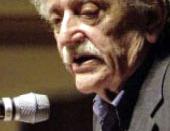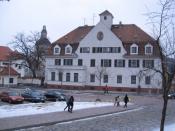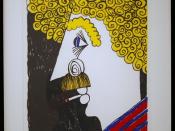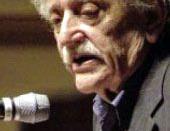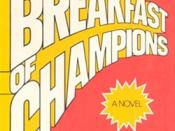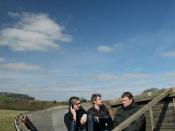"Death may be the greatest of all human blessings."The above title comes from the well known philosopher Socrates, and in fact he is right. Since the dawn of humanity, there has constantly been death, destruction, catastrophe, and horror. Because if it weren't for these things, would more humans exist today? More generations of more people? The human method of resurrecting and gaining even more power to become stronger as a race? Whether it's within our cultures or societies we know of this method very well. The hope that keeps us advancing from the worst of times into the better. It's the hope within death that new life will come and people will gain to be better that makes it the greatest of all human blessings. Hence, in such a book where it is hard to see such hope in individuals such as Billy Pilgrim and the horror of the Dresden Bombings, Vonnegut display's hope within his story.
Slaughterhouse-Five is not without hope, just as the human straits are not completely in despair.
To begin, Vonnegut emphasizes what seems to become a motif throughout the book, the three simply words, "So it goes." This phrase encompasses every death in the novel, whether it is in a small scale or large, or for that matter related to Pilgrim or not. With this phrase Vonnegut is able to put a passive twist on death. Not only so, but he is able to show that life continues and in most obvious ways that hope exists here and renewal of life as death occurs. Even renewal exists in death. This is seen in Edgar Derby, who is one of the not so many to survive the deadly Dresden incinerations, but is ironically shot for simply taking a teapot in the ruble. "Somewhere in there the poor old high school teacher, Edgar Derby, was caught with a teapot he had taken from the catacombs. He was arrested for plundering. He was tried and shot. So it goes."(214) Being as nice of a person as he was to Billy Pilgrim, his death is not regarded with pathos, but rather renewal. "So it goes." Is used in this climactic scene to bring renewal and the moving on in life, along with inevitableness. The same is done by Vonnegut with Maori, the innocent man who digs out corpses from the ruins of Dresden with Billy Pilgrim. He dies from too much vomiting from the stench. This is one of the not so many moments that Vonnegut struggled to achieve by bringing together hope and despair. Todd F. Davis wrote in Apocalyptic Grumbling: Post Modern Humanism in the Work of Kurt Vonnegut "While much of what Vonnegut writes after Breakfast of Champions suggests his hope that we may embrace and improve the lives of others through the construct of postmodern humanism, his training as a scientist prevents him from ignoring the many signs of communal decay and separation present in contemporary culture and the abominable and deadly acts such as isolation leads us to commit." (159) In a humanity where such abominable and deadly acts are committed it is through post modernism that Vonnegut expressed a little hope in all this despair.
However this isn't Vonnegut's only time where he gives renewal and hope to his novel. It also comes with the blind innkeeper with his family as they knows that Dresden has been destroyed they continue on in hope, offering renewal for others. They give the Americans beer and soup with a horse stable to sleep in. Then as the Americans living as poor prisoners prepare for bed the innkeeper quietly says, "Good night, Americans. Sleep well." in German. Later on, a pair of obstetricians scold Billy and are angered with the Americans for treating the horse. The horses' mouths are bleeding, with their hooves broken, and they are very thirsty. When Billy goes around to look at the horses, he bursts into tears. It is the only time he cries in the entire war. Here Vonnegut makes a connection with the epigraph at the beginning of the book which was a Christmas carol excerpt that tells of how baby Jesus is not crying, the same occurs with Billy Pilgrim who cries very little. A religious metaphor, which Vonnegut makes in deriving hope and renewal.
However, Billy Pilgrim throughout the book is living a sense of renewal. First, he rarely ever makes mention of the Dresden bombings. He is always content with his wealthy life as an Optometrist, the situation in Vietnam, other stories involving the Holocaust, and other deaths such as the ones of John F. Kennedy and Martin Luther King Jr. This shows that life does go on a the process of renewal exists and hope still lies in humanity as it progresses into the future, whether it is in good or death. As Wayne D. McGinnis wrote in The Arbitrary Cycle of Slaughterhouse-Five: A Relation of Form to Theme, "The poignancy and force of Slaughterhouse-Five derive largely from an attitude about art and life that Vonnegut apìparently says two things: "No art is possible without a dance with death" and "the truth is death."" As Vonnegut makes his book into a form of art from the bombing of Dresden, it is done by making a concept of death. Going back to how death itself is what progresses renewal and hope in the story.
Vonnegut is mostly seen to express this concept in his symbols throughout the book. Two of which are the moonscape and the bird in the end of chapter 10. The moonscape is always mentioned to cover all of Dresden after the fire bombings. As Billy Pilgrim emerges from the meat locker beneath a slaughterhouse into the moonscape of incinerated Dresden. In all horror and death around him, the moonscape exists as a massive image above him in beauty and escape. It exists as hope, possibly as a symbol of astronomy as new moon's come and go with new phases. The moon here is a key emphasis as to what it does. As it has been said the moon might affect what's here on Earth due to gravitational tides that not only affect water, but the ways humans act amongst themselves; and that with each new phase and changing of the moon, change occurs possibly on the Earth, along with the rotation of the solar system as life goes on, the future comes, and renewal is embraced along with hope. The bird in the end also serves as a symbol. It serves to live a new day and sing again in a peaceful way, implying that life will continue and hope does exist in the worst of places. Even Dresden where the bird's song, "Poo-tee-weet?" signifies the pointlessness of war and how all this human destruction was done for nothing and progressed nothing.
It is with these symbols, along with certain characters he uses, metaphors, and concepts of humanism and it's functioning through time, which Kurt Vonnegut is able to express hope and renewal in a book of destruction, agony, and horror upon the bombing of Dresden and Billy Pilgrim the hopeless soul left in the middle of it all. That even in the worst of times in horror and death, humanity will always be resurrected and renewed with hope.
Cited:Kurt Vonneguts' Slaughterhouse-Five.
